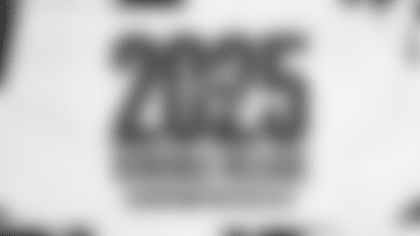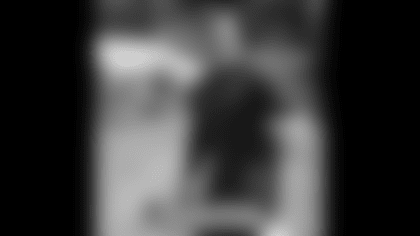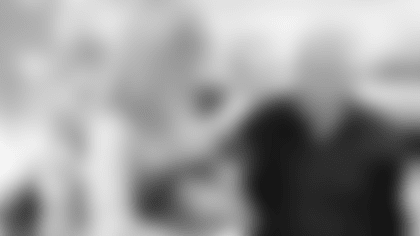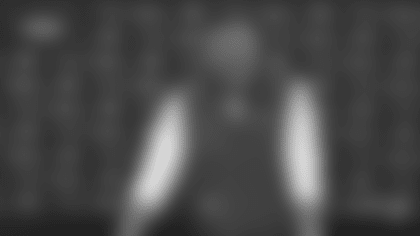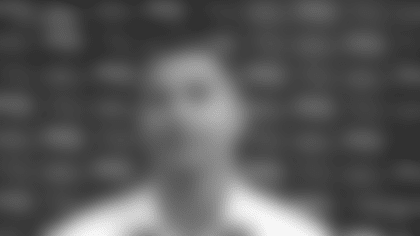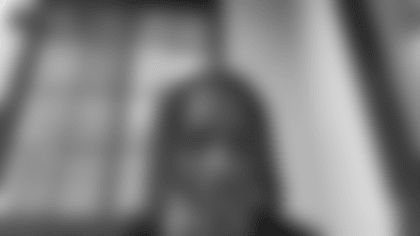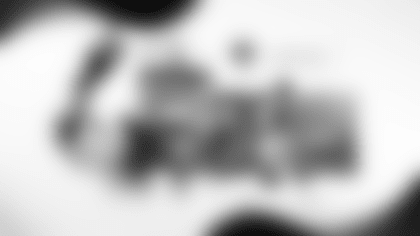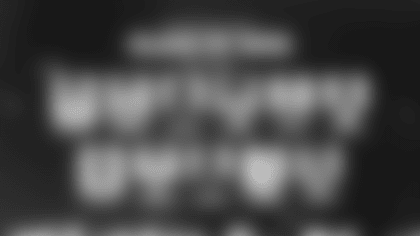HEAD COACH BILL BELICHICK
Conference Call
Friday, October 11, 2019
Q: In terms of the Golden Tate's long touchdown from the second quarter, from a coaching standpoint, are there times where you advise a defensive back to not try and go up and high-point the ball, knowing that he has no deep help and is potentially leaving the receiver with a wide open field after a catch?
BB: No, we're trying to cover the receiver, and when he tries to catch the ball we use technique. Jon [Jones] did a pretty good job of that. He got his hands on the ball, but it just popped up in the air and went to Tate. I thought he played the ball well. It's the National Football League. It was a good throw and they got a favorable bounce on it. We could've certainly played it better and done some other things better but Jon was in good position. He did what he was coached to do.
Q: Devin McCourty said the concept of a "bend but don't break" defense doesn't really exist. Why do you think your team is so good at being aggressive and embracing going after the ball like how Jon Jones did on that ball to Tate?
BB: We have aggressive players. Again, that's what our philosophy is and they try to play that way. They've done a great job of it. We had a couple other balls that came out in the game yesterday that I think the runner was down, I don't think they were fumbles. One of them went out of bounds so it wouldn't have mattered anyways, but we had several balls out which, again, is a good example of our defenders being aggressive and attacking the ball. We didn't get all of them. Like I said, a couple of them I think the runner was down but the fact that we were around the ball and trying to get it out was a positive thing.
Q: What did you see on the blocked punt? Was it as simple as Brandon Bolden having a strong rush?
BB: Well, it was an overload rush and it looked like the Giants were in their kind of zone protection on that and just trying to take up space and not really allow any gaps for the defenders to get through and Brandon had a great get off and just drove [Nate] Stupar back and got him close enough that he ended up hitting the punter. It was a really good play – well executed play by Brandon in terms of getting off on the ball. It's kind of similar to the [Dont'a] Hightower play from Chicago last year where High [Dont'a Hightower] knocked the blocker over and was able to come clean but sort of the same idea. In punt protection when you give ground, if you don't take a stand then the rushers can run you right back into the punter.
Q: I know that long drive in the third quarter didn't result in any points, how significant do you think that drive was to take over with about 12 minutes to go and not relinquish the ball to them until there was about two minutes left?
BB: Yeah, well again, the offenses goal is to move the ball and score points. That's why they go out there. We moved the ball. It was a good drive. Unfortunately, we didn't finish with any points. Obviously, there were some things we could do better to have a good final result, but certainly a lot of positive things in that drive.
Q: How does having a shutdown corner like Stephon Gilmore allow you guys to scheme and draw up different things defensively, especially in the secondary?
BB: Well, I think there are things that come up schematically throughout the course of the game that our players do a very good job of recognizing the situation and trying to take advantage – depending on what we have called – to try and take advantage of the situation. Devin [McCourty] and Duron [Harmon], Hightower, [Kyle] Van Noy, [Jamie] Collins, [Ja'Whaun] Bentley – those guys are all kind of a part of that depending on what type of play it is and where they're located and so forth, so we have different things that we can do and it really comes down the players understanding those situations, making good decisions and having communication so we can execute them, and we had several of those last night. Certainly the corners, Gilmore and Jason [McCourty], Jon Jones, J.C. [Jackson], are a big part of that in terms of the overall execution and they give the corners confidence and flexibility to utilize some of those calls.
Q: James White seems to almost always get positive yards when the ball is in his hands. What is it about his running style that allows him to be able to get up the field quickly and turn something that might not be there into at least some positive yardage?
BB: Well, James has good quickness. He has good pad level. He drops his pads well so that sometimes defenders don't get a solid hit on him and he's got good balance and so he can take some hits and gain positive yardage. I think he's a hard guy to tackle, he's deceptive, but he makes great decisions and he gets the ball up field and he gets positive yards, so you rarely see him lose yardage. He'll take the best available option and make the most of it. [He's] a really good decision maker and, again, fundamentally a good player, good lower body strength, good quickness, good ball security and good pad level.
Q: How important is it for players and coaches to maybe just get away and be able to rest a little bit this weekend following a Thursday night game?
BB: I agree with that, Mike [Reiss]. Thursday night games are tough. It's a quick turnaround. The preparation is tough. The physical rebound off a Sunday game is tough. We traveled from Washington, they traveled here for the game so when you add all of that up, it's a challenge but you're right, there's the other end of it. So now we're glad we have a few extra days here to kind of rest, recover and evaluate where we're at here and be ready to move forward for the Jets, which comes on a long week so when you add them all together, other than a bye it's about as much time as you're going to get during the NFL season. We'll try to take advantage of that and utilize whatever time we have, which is what we always try to do, utilize it efficiently. There's certainly a lot of things we need to work on. There's certainly a lot of things that we can evaluate. We have six games and these guys have been playing a lot of football. Really, it's been pretty non-stop for the last 12 weeks going back to the start of training camp in July. You grind all the way through camp, grind through six regular season games. It's tough. But now it's an opportunity to get a little window and so we'll try to take advantage of that and be ready to go against the Jets.
Q: What did you see from Jakobi Meyers and Gunner Olszewski last night in their first extended offensive time, and what do they do behind the scenes to get ready for those opportunities?
BB: Right. Well both players, as you said, did get an opportunity to play a little bit more last night. There were some good things, certainly a lot of things we need to work on, things we need to improve, techniques and just coaching points, but both of those kids work hard and they're both trying really hard. They're getting better. They just have a lot of ground to make up relative to receivers, experienced receivers like Phil [Dorsett] and Julian [Edelman], guys like that. Making progress. We'll continue to correct the mistakes and work on things we need to improve in and hopefully be able to do them better next time, but they've both shown up positively in some of their opportunities and that's a good thing too.
OFFENSIVE COORDINATOR JOSH MCDANIELS
Conference Call
Friday, October 11, 2019
Q: After the game last night, Bill Belichick mentioned you did a nice job when you were limited to one personnel grouping. What kind of challenge was it for you in terms of trying to put together a consistent offensive game plan?
JM: Well, I mean, I appreciate that. I think the players really deserve all of the credit there. You go into a game plan with an idea of what you want to do with the personnel that's available to you. Usually, that includes and encompasses multiple personnel groupings. As you saw at the beginning of the game, we used all of the ones that we had available to us last night early. There's always plenty in the game plan from different personnel groupings because you just want to use the strengths of the players you have and put them in positions to try to do some things to help you move the ball and score points. So, when we ended up with Matt [LaCosse] and Jak [Jakob Johnson] and Josh [Gordon] all going out kind of right in a row there, it took out of a good chunk of what we had worked on in terms of our preparation. All you can do at that point is focus on what you have left. And we had a lot of confidence in that group, we just didn't have a lot of volume, and so kind of scrambled on the sideline, scrambled at halftime, scrambled on the sideline in the second half, and the credit really goes to the guys that were out there. I mean, we had I believe 10 players that played about the last 50 plays of the game with no rest because we didn't have a substitute. They deserve a tremendous amount of credit for that, and they really did a good job of playing a lot of roles and doing a lot of things in the game that they hadn't necessarily walked through last week or practiced with very few mental errors. Again, it's one of the most rewarding parts of coaching is just trying to handle the adversities with your guys, and I thought our players had a great attitude and resolve about themselves last night. It certainly wasn't perfect, but grinded it out and the guys that were in those positions really stepped up and made a lot of plays that helped us.
Q: What have you seen from Jakobi Meyers' footwork and how much has that helped him during his first year in the NFL?
JM: Jakobi's worked hard at a lot of areas of his game. He works hard in practice. One thing about Jakobi, he's out there every single day. Jakobi hasn't missed any time in the spring or in training camp or during the season. So, when you're out there and available in practice and you work hard, you have a chance to improve. Footwork's certainly an important part of playing the position of receiver, and he's really tried to work at complementing his releases, his stems, the top of his routes. There's a lot of things that go into getting open and creating separation for a receiver. And, for a young receiver, it's always a unique challenge because you don't necessarily get challenged as much in college football – there's more off coverage and so on. So, to be able to come in and continue to work on those things to try to find new ways – you've got to be creative. Because once there's a lot of tape on film, players study – and we have a lot of smart defensive players we play against – a lot of guys that study a lot of tape and are well-coached. And so if you put tendencies on tape, people are going to start overplaying those. So, now the challenge is to try to continue to work on broadening what you can do to use for yourself to try to make the same routes look different and then maybe add something to your [inaudible] every week if you can go out there and maybe try something new that we're trying in the game plan and improve yourself that way, too. So, footwork is always a work in progress. Receivers work at it every single day, and he's going to continue to get better because he works at it.
Q: When you think about some of the great goal line rushers in NFL history, is it going to be Tom Brady after what we saw yesterday?
JM: I have as much confidence in him and our line in those situations as you could have. I'll tell you what, that play, if you study that play in the history of our league – and again, I don't claim to be in my 70's here – but I've watched enough and seen enough and we've studied enough of it. It's not as easy as it looks. The first thing I've always said to any quarterback that is going to try it is, "You have to be willing to do it." There's an inherent courage and willingness to send your body into a bunch of 300-plus pound men and push and not go to the ground and not lose the ball and have an awareness of where you're at and also find the sweet spot, which he does a great job of. We used it, I think successfully, three or four or five times last night, and the guys up front really did a good job of getting some push and wedging in there and not letting the defender get contact to him too early in the play. And Tommy just does such a great job of burrowing in there, and his legs never stop moving and he has just a knack for knowing how far he needs to get and knowing where the sweet spot in the defense is and really finding a way to get to the yard line that he needs to get to, or get it in the end zone in that case last night.
Q: If you were to tell a young receiver to study Julian Edelman, what is it about Julian and what he does that you would point out to a younger receiver?
JM: Well, Julian's arrived at this place over many years. He has a lot of experience, obviously, now. When he was a young player, he was learning like some of the young players on our team are, and you've got to be careful with trying to start at a place that's almost impossible for them to start at, but you can take little things – his releases, his footwork during the course of routes, the way he tries to make something look different or maybe make two things look the same when he's trying to play off of one another. He's very, very tough, he's physical and he does a great job of protecting the ball when the ball's in the air because he comes downhill; he doesn't get undercut. There's a lot of good things that Julian does, obviously, to be as productive as he is, and our receivers are trying to study those things. But, like I said, you've kind of got to build it the right way when you're a young player. It's like trying to tell a young quarterback to do everything that Tom does. That's impossible. So, you've got to start somewhere, and you certainly want them to emulate the good things that they see from the veterans that are above them, and Julian has a lot of those qualities. So, they're watching, they're hearing everything in the meetings. He does a great job of offering up information to them and you see some of those things. You saw some of those things last night. Those guys are doing a good job of trying to protect the football in the air. I thought Jakobi made a great play on the one over route where he grabbed the ball and then tried to hide the ball from the defender so they couldn't knock it out. That's something that Julian does, and just little things like that. They're working hard. Really proud of the contributions that Gunner [Olszewski] and Jakobi made last night. Like I said, those guys both played over 50 snaps last night, and that wasn't necessarily the intended plan. Really excited to see those guys come in there, answer the bell. [They] made six catches, I think, for 80-something yards, helped our team and didn't make any mental errors. So, credit to those guys and excited to continue to work with them.
Q: When you're designing plays, how cognizant are you of giving information to Brady pre-snap, like using motions or the running back out wide so that he can diagnose the coverage before the ball is snapped?
JM: Yeah, I mean, there's a lot of things you're trying to think about when you're designing the scheme. One is just to try to avoid being self-scouted so much that your tendencies become clear and obvious to the defense. So, you need to change formations for that reason, too. Sometimes there's information you can gain. Sometimes there's no information you can gain based on the defense and the scheme and the coordinator and what they do on defense. Sometimes there's an element of that. Sometimes there's not. Ultimately, at the end of the day, it comes back down to our execution, whether it's a run or a pass play. Sometimes we can gain some information and sometimes we can't. That's just football. It's the nature of the game we play and that's why we focus so much on fundamentals and our execution, because at the end of the day, whatever the scheme is, if we have good fundamentals and if we execute them properly, we have a chance. It doesn't matter if you have the prettiest play ever drawn up. If your fundamentals are poor or you don't execute them properly, you're probably going to struggle. There's an element of that, certainly, but you've got to be careful about putting too much weight and stock in that because that certainly alone isn't going to do it for you.
Q: When young players are going to get more work in a game, do you incorporate how Brady feels about his connection with those particular players when they're not the guys that get the most first-team reps in practice?
JM: Well, No. 1, we have confidence in all our guys. That doesn't mean we have a tremendous amount of experience in every scheme with every player that we have on our team, but we have a ton of confidence. I think, to me, they're on the team for a reason. They've produced, they've shown that they can execute the things that you need to execute to play in our offense at those positions, and our job really based on the personnel that we have is to try to put all our players, all 11 of them, in a position to do something that No. 1, they're confident in doing themselves, and No. 2, that their teammates are confident in them doing, as well. So, maybe there's something that Josh Gordon would do that maybe we would do a little differently with Gunner, or maybe there's something that Julian does that we would do differently with Jakobi, or Phillip and somebody else. So, there's elements of the offense that you tweak and you change based on who's out there because you always want to try to play to the strengths of the players. If you can do that as many snaps as possible in a game, hopefully you're always trying to run things then that they feel good about and in turn, the quarterback and the passing game also trust and feels comfortable doing, as well. But, there's no shortcut for repetitions, experience, practice time. That's how you create trust and confidence in one another. You can't just go into a meeting and tell people to be confident. You have to do it on the practice field. You have to execute it. We've always had a saying that practice execution becomes game reality. To me, that sums up trust and confidence right there. So, that's why we put so much stock in what we do at practice and on the practice field because we believe if we can execute it out there and really gain trust and confidence and feel good about what we're doing out there that we have a chance to carry it over into the game.
Q: What progression have you seen from Ryan Izzo, both throughout this season and specifically last night when he had to play those last 50 snaps?
JM: Well, Ryan actually played way more than that. He ended up playing like 77 or somewhere in that vicinity. He almost went the entire way. He was basically an ironman last night. But, Ryan's got a great work ethic. I'd say the same thing about Ryan that I said about Jakobi. The No. 1 thing is he's been out there every day, except for maybe a practice here or there. When you're healthy and practicing, you have an opportunity to make progress and improve, and I think that's what we've seen from Ryan. Ryan's got a great attitude and a great approach. He works extremely hard and Ryan's just continuing to develop as a young player in all areas of that position, which is a difficult position. We've talked about that before. There's a lot that goes into playing tight end. You're a pass receiver, you're a run blocker, you're a pass protector. There's a lot of things that could change on a single play. We ask them to read things in the coverage. Their responsibilities in the running game could certainly change based on the fronts or the looks we get. So, there's a lot of challenges to that position. I think Coach [Nick] Caley does a tremendous job with all those guys of getting them ready to play, and they have a ton of things that we put on their plate each week. For a young player to continue to work at those things, he sticks his face in there, he's physical and tough in the running game, he's made some contributions for us obviously in the passing game, he's had good hands when he's had the opportunity to catch the football in the passing game. So, Ryan's continuing to develop. Certainly, we have a long way to go. We would say that with all our guys. But, we're continuing to head in the right direction, and certainly appreciate the contributions that he made yesterday, basically playing most of the entire game yesterday on a short week.
SAFETIES COACH STEVE BELICHICK
Conference Call
Friday, October 11, 2019
Q: One thing that stands out about the defense is the pursuit to the ball. What do you see in that regard, whether it's your position group or the defense as a whole, from a pursuit standpoint?
SB: Yeah, obviously hustle, effort and pursuit to the football are important fundamentals we stress every day. Players do a great job of zone coverage, rallying up to the ball breaking up to the ball and breaking off a throw in man coverage. D-line does a great job turning and chasing the ball once it's thrown. Did a good job on screen passes, all those short passes, getting a bunch of hats around the ball Yeah, it's definitely a huge point of emphasis for us and guys have been doing a great job at it.
Q: The last couple weeks you have seen Terrence Brooks play a little more on defense. What have you seen from Terrence as he and Joejuan Williams as the only new guys in that defensive back group? What have you seen from him?
SB: Terrence comes to work every day with his hard hat on ready to go, ready to work. He's always excited for whatever role you give him. We've put a lot on his plate defensively and special teams. We keep giving him more to do and he keeps coming through for us. So yeah, been pleased with everything that Terrence has done. Can't say enough good things about him – hard worker, tough kid, loves football, loves to compete. He's fit in really well with the veteran group that we have.
Q: The combination of the safeties and corners are playing so well in tandem so far this season. How good does it look right now and what improvements do you guys think you guys can make in terms of the way the cornerbacks are playing along with the safety group?
SB: Yeah, we meet a lot together as a group, put a lot of hours in off the field, obviously on the field too. Those guys work really hard at the communication aspect of it, getting everybody on the same page, just giving ourselves a chance on the down to be successful. Those guys have worked really hard on being versatile and handling different roles, doing a lot of different things in the secondary. Disguising really well, mixing up and playing each other's assignments. Those guys do a great job of that and it's really not that surprising because of all the hard work they've put into it. We definitely have a long way to go, just a third of the way through the season. So, Lot of football left, long way to go but we're excited with how we're playing right now.
Q: How important is the experience factor back there? You have a lot of veterans with the safety group in particular. How much of an advantage is that coaching them with whoever is calling the defensive signals?
SB: It's really important. It's huge to have a lot of experienced guys in the secondary. We've been working together for a couple years now, however long it's been. We've built up a deep library of plays so far since I've been working with these guys and just trying to use it all as learning tools and build off of what we've done and keep improving. But, the experience definitely helps with those guys and being able to continue to do more and build on what we've done.
Q: Stephon Gilmore appears to be playing at an elite level. Other than working hard and watching film, what technically makes him so special right now? What is he doing in terms of what you see that makes him among the best of the best?
SB: Steph really just loves the game, has a strong passion for the game and holds himself to a high, high, standard. When he goes out there, he wants to be the best. He wants to perform at his best and he practices and prepares that way. I haven't really compared him to anybody else, Steph's his own guy; he's his own player. He goes about his business his own way and it's obviously been impressive so far. Still have a lot of things to work on, as we all do. But yeah, he's been doing a great job and I'm not surprised by the success he's had because of the preparation and work he puts in. Hopefully he continues to do that for us.
Q: Is there anything about his footwork, ball skills, strength? In your opinion, what couple of things put him among the elite other than the drive?
SB: Yeah, his drive and the attributes that he has - speed, size, quickness, strength, play strength - all that stuff. Just a natural feel for the game, trust in the players he's playing with that everybody will be where they're supposed to be. Not just kind of playing out on his own but using the help he has when he gets it. Playing within the defense and just executing his role and his assignments. Yeah, he does so many things well it's hard to just pinpoint one thing. His preparation and obviously the skill set that he has, it's a pretty good combination.
Q: We talk a little bit about the versatility of the secondary, like Jon Jones might play the safety role or you see Devin McCourty drop down and look like he's in a corner role and Joejuan Williams at safety times. Do those guys come into your room when they're coming back to safety? How does that work? Are corners and safeties meeting together? How does that crossover work in that regard?
SB: The meetings are a little bit different every week depending on the game-plan, the opponent, all that stuff. We met a lot as a group last week being a short week and not having the normal time to prepare. I don't know, I can't really remember how each week has gone but we try to prepare all the DB's to handle whatever roles we have. We've been playing with a lot of depth, a lot of guys handling different spots. Smart group, they take the coaching pretty well. We just try and utilize everyone's skill sets the best we can and not put anybody in bad position as coaches and try to put them in the right positions to succeed and make plays.
Q: How beneficial do you think it is for the younger receivers and tight ends on the team to go against the seasoned secondary in practice and have you seen development from those guys?
SB: We get a lot out of going against them. Hopefully they get a lot out of going against us. I've seen those guys grow a lot since they've been here. Going against them every day in practice I'm not sure exactly what our group does for them specifically. They do a lot for us, they all have a little bit of different skill set. They do some stuff differently, some better than others. It gives us a chance to see a different type of player. Obviously as they have gotten better this year, it's helped us elevate our game too. You'd have to ask them what it's like to go against us, but it's always challenging going against them. We love those competitive periods in practice when we get to them, having a chance to go ones on ones.














